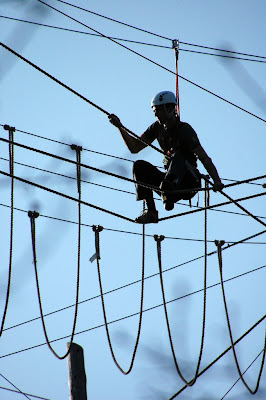
Working with corporate clients.Many of them have given me the pleasure of consulting for many years now. At this point know and have a good idea of my bag of tricks have dialed in to ask me the questions to receive the answers they need.
How does this apply to Challenge courses and Ropes Courses for Team Building?
Everyone has a perception within their minds. This perception is an Individual Construct (IC).
Also, the team has a perception, almost shared I call this Team Construct (TC).
If a person has experienced a team building activity and knowledge of a solution or best practice, this is their IC. It may very well be wrong, and it may lead them to a false IC.
Their IC may be a brain rut causing repetition of false beliefs. The more this IC of false belief repeats and the person feels that they know they are right the further it will set the team back.
Once the TC is instituted, the team can begin to share insights of perceptions shared from all the IC’s into a shared pool of knowledge, Deepening the TC pool.
With business and behaviors, we feel that many habits we have are the correct ones. Why – because they have never been challenged, our IC’s are a safety mechanism the comes from practiced, learned and repetitive behaviors.
What can be done to re-direct and connect changed behaviors is get to the TC and have all the members openly share their best practices for solving challenge course initiatives. Once we have a firm understanding of what all our IC’s are, the team begins to develop new patterns of behavior that lead to different outcomes.
If a participant has an experience I encourage them to share the experience, although I also encourage team members who have never experienced the ropes course element and team building initiative to share their ideas.
 Once you get all different data-points and Constructs on flip charts and planning sheets the team can them decide what the best is and useful solution. Also, once individuals who have experienced a challenge course shares, they find that the experience they had (IC) is nothing like the experience that the person who was next to them the entire time had (IC).
Once you get all different data-points and Constructs on flip charts and planning sheets the team can them decide what the best is and useful solution. Also, once individuals who have experienced a challenge course shares, they find that the experience they had (IC) is nothing like the experience that the person who was next to them the entire time had (IC).
This difference in experience is the joy of experiential education – we can be together, doing the same thing and have different experiences Individual Constructs.
People at work do the same jobs every day, continuously, they fall into behaviors and ruts that are repeated and constantly scripted, “Do you want fries with that.”
Think about yourself what behaviors do you fall into habitually, are these behaviors damaging your effectiveness and ability to contribute to your team, your actions to your family and loved ones.
This is why we need a culture of continuous learning and development – the longer you have been doing something, the stronger your IC that it is right and the only way to do it, I call this the “folkloric Construct.”
As a team building consultant, one of my responsibilities is to allow teams to see these continuous ruts of behavior, discuss them in a TC context, then transfer these behaviors to the workplace.
Continuous learning and improved patterns should be, must be facilitated.
Photos – Gaetan Lee helmet13

